

Guidelines for writing good questions. General advice Try to ask questions only directly related to what you are evaluating and not just for the sake of it.
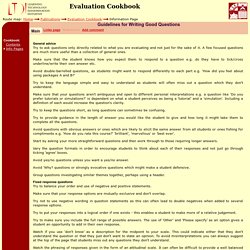
A few focused questions are much more useful than a collection of general ones. Make sure that the student knows how you expect them to respond to a question e.g. do they have to tick/cross underline/write their own answer etc. Avoid double-barrelled questions, as students might want to respond differently to each part e.g. 'How did you feel about using packages A and B? ' Try to keep the language simple and easy to understand as students will often miss out a question which they don't understand. Make sure that your questions aren't ambiguous and open to different personal interpretations e.g. a question like 'Do you prefer tutorials or simulations?
' Try to keep the questions short, as long questions can sometimes be confusing. Try to provide guidance in the length of answer you would like the student to give and how long it might take them to complete all the questions. Evaluating e-Learning. It could and perhaps should be argued that the design, implementation and evaluation of e-Learning is essentially no different from any other form of learning and many of the evaluation methods and tools described elsewhere on this website apply equally well to e-Learning.
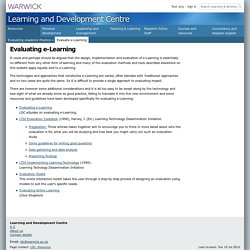
The technolgies and approaches that consitiutes e-Learning are varied, often blended with 'traditional' approaches and no two cases are quite the same. So it is difficult to provide a single approach to evaluating impact. There are however some additional considerations and it is all too easy to be swept along by the technology and lose sight of what we already know as good practice, failing to translate it into this new environment and some resources and guidelines have been developed specifically for evaluating e-Learning: Evaluating e-Learning LDC eGuides on evaluating e-Learning. LTDI Evaluation Cookbook (1998), Harvey, J. UMD Student Online Pilot Evaluation Template - DEPT crsNum (Prof) CTDLC Online Course Evaluation. Online Course Evaluation We are dedicated to creating excellent distance learning courses.
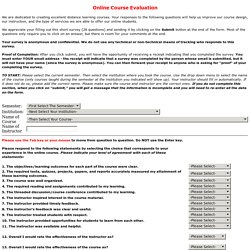
Your responses to the following questions will help us improve our course design, our instruction, and the type of services we are able to offer our online students. We appreciate your filling out this short survey (26 questions) and sending it by clicking on the Submit button at the end of the form. Most of the questions only require you to click on an answer, but there is room for your comments at the end. Your survey is anonymous and confidential. Proof of Completion: After you click submit, you will have the opportunity of receiving a receipt indicating that you completed the survey.
TO START: Please select the current semester. Course Evaluation Form for Individual (Open Entry) Courses. Be assured that this information is confidential and will not be revealed to any outside parties including the instructor.
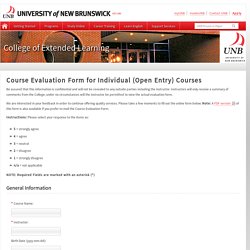
Instructors will only receive a summary of comments from the College; under no circumstances will the instructor be permitted to view the actual evaluation form. We are interested in your feedback in order to continue offering quality services. Please take a few moments to fill out the online form below. Note: A PDF version of this form is also available if you prefer to mail the Course Evaluation Form. Instructions: Please select your response to the items as: Evaluating Online Courses.
Introduction The evaluation of online courses involves many of the same criteria applied to traditional classroom courses but also necessitates the use of new criteria more directly based on the online environment.
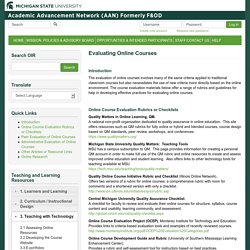
The course evaluation materials below offer a range of rubrics and guidelines for help in developing effective practices for evaluating online courses. Online Course Evaluation Rubrics or Checklists Quality Matters in Online Learning, QM. A national non-profit organization dedicated to quality assurance in online education. Michigan State University Quality Matters: Teaching Tools MSU has a campus subscription to QM. Quality Online Course Initiative Rubric and Checklist (Illinois Online Network). Central Michigan University Quality Assurance Checklist. Articulate E-Learning Heroes Community. Articulate E-Books. Post-Course Evaluations for E-Learning: 60+ Questions to Include.
Feedback Model to Support Designers of Blended Learning Courses. December – 2006 Hans G.
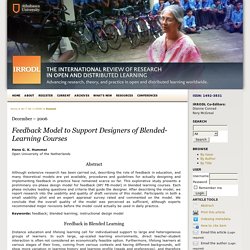
K. Hummel Open University of the Netherlands Abstract Although extensive research has been carried out, describing the role of feedback in education, and many theoretical models are yet available, procedures and guidelines for actually designing and implementing feedback in practice have remained scarce so far. Keywords: feedback; blended learning; instructional design model Feedback in Blended Learning Distance education and lifelong learning call for individualised support to large and heterogeneous groups of learners.
Although extensive research has been carried out into feedback’s role in education, yielding many theoretical models (Butler & Winne, 1995), procedures and guidelines for actually designing and implementing feedback in educational practice have remained scarce so far. Feedback The concept of feedback in learning actually is an ‘umbrella concept’ that entails several meanings beyond the narrow meaning of feeding back information after task completion. Url?sa=t&rct=j&q=&esrc=s&source=web&cd=6&ved=0CD4QFjAFahUKEwi9p7T13v7GAhUNe5IKHcq9DiI&url=